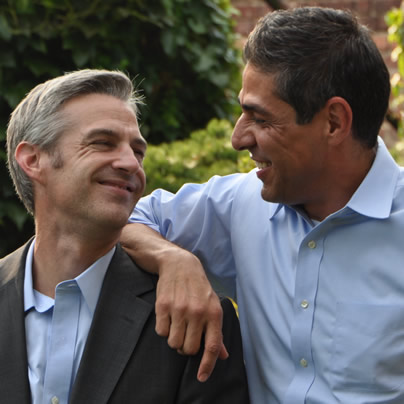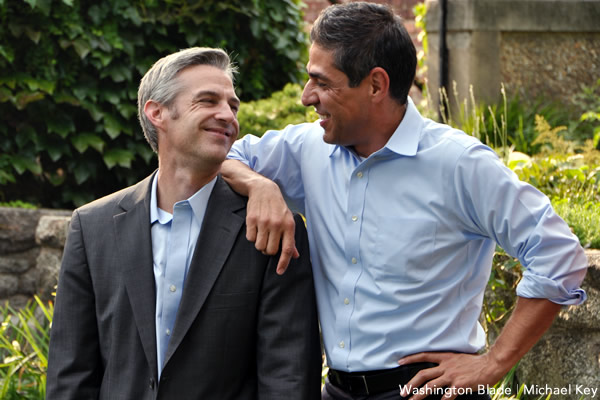Advice
Avoid nasty surprises after tying the knot
Don’t just plan the wedding — plan your marriage


(Washington Blade file photo by Michael Key)
By DOUGLAS CHAY
When planning your wedding, don’t forget to plan your marriage. Pre-marital planning includes, but goes beyond, figuring out the mechanics of the marriage. It involves developing a deeper level of personal insight, a better understanding of your finances and of the relationship itself. You can avoid nasty surprises later on by learning about and addressing discrepancies in your and your partner’s expectations for the future before tying the knot. Make sure you discuss the following:
1. Communication: Give yourself and your fiancé permission to discuss concerns even if you’re afraid it will hurt the other’s feelings or result in an argument. Conflict is good. It gives us the opportunity to practice problem solving. Agree on rules for arguing which should include no name-calling, threats or idle ultimatums. When you argue, be honest with yourself about whether your goal is to resolve an issue or win an argument. Avoid mind reading. No matter how convinced you are that you know what your partner is feeling or thinking, you may be wrong. Ask before you react.
2. Intimacy. Determine what combination of emotional and physical intimacy works the best. Develop your friendship and make time for each other. Discuss your expectations of your sexual relationship, including whether both of you want to experiment with new sexual behaviors and if so which ones. Find out how frequently your partner wants sexual contact and what kind (do not base this on how often they ask for it). How about you? Can you reach a compromise if there is a significant discrepancy? Is masturbation OK? Is porn OK? Is leaving your profile on Grindr or Pink Book OK?
3. The Semantics of Marriage. Do you want an “open” relationship? If so, what are the rules? Does marriage=monogamy? What does monogamy mean? I have worked with clients whose definition of monogamy was avoidance of anal or vaginal sex outside of the marriage. Others felt that watching porn was akin to having a full-blown affair. Don’t assume that your partner means the same thing you do when you use these terms. Talk.
4. Outness. Being in the closet while you are married carries different implications than being closeted while single. If you are married, your level of “outness” affects not only your spouse, but also the two families and networks of friends that you married into. You no longer can claim that your sexual orientation is nobody else’s business. If you plan to remain closeted indefinitely, you are implicitly asking your spouse to step back into the closet with you.
5. Tasks. Marriages involve a significant amount of grunt work. Paying bills, mowing the lawn, vacuuming, cooking, chopping wood, etc. Identify the tasks and agree to a fair distribution. Be flexible in changing who does what as circumstances change.
6. Finances. Would it matter to you if your spouse wanted a separate bank account? Do you want a prenuptial agreement? Would it work better to have multiple accounts or one? Discuss how decisions will be made for large purchases, who manages the money and how to deal with income disparities. What is a “fair” financial split between a spouse whose earns 50 percent less than the other? Does one feel guilty or resentful for earning less or more money? What happens if one becomes unemployed?
7. Emotional Baggage: While growing up many of us learn to hide certain emotions, and/or limit their expression. As adults, if we continue to suppress or compartmentalize them, they come out unexpectedly, usually directed at the “safest” person in our lives: our spouse. Not coincidentally, this is the person you least want to hurt. If this sounds familiar, discuss it, take responsibility, and get help to fix it. As long as your spouse sees you making an effort, she/he will be more likely to be patient and recognize these behaviors for what they are: part of the baggage that we all bring to our relationships.
Douglas Chay is director of the Pride Counseling Center in Columbia, Md. He is a member of the American Association of Sexuality Educators. Reach him at pridecounseling.net or [email protected], 410-744-4867.

Dear Michael,
I keep getting rejected on the apps. I don’t want to put myself out there anymore.
I don’t understand gay men. I think they behave really badly.
Guys stop replying in the middle of a text conversation and then un-match me. Guys don’t show up when we make a plan to meet. After a date or even a hookup that it seems clear we both enjoyed, I never hear from the guy again.
I am a pretty good looking and successful guy. I’m not a model or a billionaire but I’m sincerely wanting to date and eventually share a life with someone.
Unfortunately, everyone I am meeting, even if they say they have similar aspirations for a partner, acts like they’re looking over my shoulder for something better, and drops me for I-don’t-know-what reason.
I don’t have a lot of trust in the sincerity of gay men.
I know I sound bitter but I’ve been at this for a while and it keeps happening.
I know there’s a saying that if it keeps happening to you, you must be the problem. Logically that makes sense.
Except, I think this keeps happening so often and so predictably that it’s not me. These people hardly know me. It’s more along the lines of, if everything about me isn’t exactly what they want, or some little thing that I say, think, or do offends them, they vanish.
I’m lonely, but what’s out there is awful. Maybe it’s best to not keep trying.
If you have a different way of seeing it that’s honest, not just some fluff to make me feel better and be hopeful, please enlighten me.
Michael replies:
I agree with you, there is a lot of this kind of behavior out there. I hear stories similar to yours all the time. Though people do find great relationships online, relying on apps to meet a partner can be tricky.
Hookup apps have little to do with any kind of real connection. Often, they don’t even have much to do with sex. For a lot of people, they’re more about trying to fill up some kind of emptiness and seeking validation. They also, obviously, objectify men, which is the opposite experience of what you’re seeking.
And dating apps lend themselves to a sort of takeout menu concept of dating. You get to specify exactly what you’re looking for—a little of this, a lot of that, please omit something else—and then believe you should get what you ordered. As if that really exists. And when something isn’t just what you wanted, forget it.
But life doesn’t work that way. Nor do people: You can enter the exact criteria for the man of your dreams, but he will surprise you or let you down at times in some major ways. That’s how it goes. Part of being in a relationship is accepting that we all have to deal with imperfection.
All that said, hordes of people are going to keep using all sorts of apps and keep looking for “perfect” partners and keep ditching perfectly fine guys for the most minuscule of reasons.
But that doesn’t mean that you have to stay on the apps if it’s demoralizing you and leaving you hopeless.
Before you sign off, perhaps you would like to have some fun and be creative. Just for example, you could write in your profile that you’re interested in meeting a guy who isn’t looking for perfection and is looking for a decent soul rather than a set of stats. You still might encounter a lot of guys who ghost you for no apparent reason, but you also might have some luck finding a sincere someone with relationship goals that are similar to yours.
Another, complimentary strategy: Toughen up your attitude to stop letting let these rejections get under your skin. They have little to do with who you are (unless you are oblivious to some major issue about yourself), so you needn’t take them personally. In other words, expect this to keep happening; and when it does, laugh and keep moving forward.
I understand you are feeling like giving up on gay men in general. Keep in mind that while there are a lot of reasons why many gay men focus more on sex and less on commitment, that isn’t true across the board. In my work over the years, I have met many gay men who are looking for what you’re seeking. You could strive to be hopeful that if you keep looking, you are likely to cross paths with some of them.
And where you look may play a role.
Whether or not you stay on the apps, I suggest you seek additional ways to meet a potential boyfriend. Before apps existed, people did find other ways to meet romantic partners, and these ways do still exist. I know that this path is not an easy one. The whole dating endeavor isn’t easy. But difficult is not impossible.
There are social and activity groups for gay men that are organized around some sort of shared interest. They aren’t overtly sexual, so often attract people who are interested in and looking for a deeper connection. Even if you don’t meet a boyfriend there, you might make some like-minded friends, and one thing may lead to another in all sorts of ways.
There’s also plenty you can do as a human being (not simply as a gay man) in the offline world that might interest and even uplift you, where you just might meet a man you like. Again, you might also simply make some friends, and through having a bigger social life, might ultimately meet your guy.
Simply put: Don’t let yourself feel like or be a victim. Don’t keep putting yourself in miserable situations. And figure out what it means for you to do your best to make what you’d like to happen, happen.
Michael Radkowsky, Psy.D. is a licensed psychologist who works with couples and individuals in D.C., Maryland, Virginia, and New York. He can be found at michaelradkowsky.com. All identifying information has been changed for reasons of confidentiality. Have a question? Send it to [email protected].
Advice
How to cope when a partner gives you the silent treatment
Punishing behavior brings up memories of parent’s mistreatment

Michael,
My wife and I met less than two years ago and we were crazy about each other from the start. We wanted to spend life together so we just went for it. Maybe this wasn’t the most well-thought out decision on either of our parts but we thought that love conquers all.
But lately we’ve been arguing. The stuff we’re fighting about is never such a big deal: chores, or spending, or wanting to do different things on the weekend. But when I don’t want to go along with Michelle’s point of view, she gets angry and shuts down. Sometimes she stops talking to me for as long as a few days.
This is painful for me. My mom used to pull this stunt when I was a kid and she was mad at me. She also cut me off when I came out. We’re still estranged.
Michelle has a whole different take on this. She says I am being “mean” to her (when I don’t go along with what she wants) and this is painful, and she has to “take a break” to cool off.
I know she comes from a volatile family. She has told me there was a lot of screaming in her house, and she barely has a relationship with her parents as a result. So I get that she’s sensitive to conflict.
But I don’t think I’m being mean to her by standing up for what I want — certainly not enough to warrant her giving me the silent treatment.
We got married to have a great life together. We often do but I can’t live with someone who just shuts me out when she’s annoyed with me.
If I became a doormat and went along with everything she wants and never pushed back or complained, maybe she wouldn’t shut down. But I don’t want to do that.
I’d appreciate some ideas to improve the situation. I don’t want a divorce but I also don’t want to keep being mistreated.
Michael replies:
You can think of marriage — or any serious relationship — as a gym where you have ongoing opportunities to become an increasingly resilient person in the face of the ongoing challenges that an intimate relationship poses.
Your task here is to shift your focus toward figuring out how to handle yourself well, even in the awful circumstance of getting the silent treatment.
Michelle is not under an obligation to behave as you’d like her to. You can certainly ask her to stop withdrawing when she’s angry at you. But that doesn’t mean she is going to honor your request.
I well understand that Michelle’s punishing behavior is bringing up painful memories of your mother’s mistreatment. But if she doesn’t change her behavior, you have to find a way to live with Michelle as she is, with as much equanimity as you can muster, for as long as you choose to be married to her. If she does not change and you find her behavior to be unbearable, you can leave.
Every time she shuts down, Michelle is handing you an opportunity to figure out how you, yourself, can deal with feeling hurt and let down, rather than depending on someone else to behave as you’d like her to, or not upset you, or soothe you. Being in charge of your own mood rather than letting someone else press your buttons is a great skill to get better at.
I’m not going focus on what techniques you might use to soothe yourself — that’s a different column (or even better, a number of therapy sessions). That said, knowing that Michelle’s behavior comes from her history might help you to take it less personally. And, simply keeping in mind that living with a difficult spouse is unavoidable and worth getting better at may help you to quiet yourself down.
Another challenge that your marriage is pushing you to work on: Discerning when you can be generous, and when it is important to have a boundary. Of course, I understand that you don’t want to be a doormat by going along with whatever Michelle says and wants. But is it possible that she has a point, in that you could stand to lean more in her direction?
None of us get to have everything the way we want when we are in a relationship (much less in life). Figuring out the interplay between generosity and boundary is complicated. It often involves considering what is important to your partner; and deriving joy from her getting some of what is important to her, not only from your getting what you would like. And of course, it also involves figuring out what is most important to you.
If you set a boundary thoughtfully, because something is important to you, and Michelle doesn’t like it, you’re being handed an opportunity to get better at tolerating disappointment. Being a disappointment to your partner, and being disappointed in your partner, are both unavoidable parts of marriage: We’re all different, and at times will make choices that the other person really does not like.
If we make our decisions from a place of integrity rather than whim, entitlement, anger, or “whose turn it is”, and strive to honor the choices that our partners make from a place of integrity, this often makes the disappointment easier to bear.
Of course, it would be great if Michelle would join you in working to become a more solid and resilient spouse. As I mentioned earlier, you can’t persuade her to do so. But you can certainly tell Michelle what you are working on and ask her to consider how she, too, might use your relationship difficulties as a challenge to grow.
It isn’t easy to have such a conversation without sounding condescending. You are better positioned to do so when you are walking the walk, not just talking the talk. One good rule of thumb is to put you and your partner in the same boat, making it clear that you see the two of you as facing the same challenges, rather than positioning yourself in a superior position. Another is to initiate the conversation when you are both calm, rather than in the middle of a fight or when you’re getting the silent treatment.
One more point: If Michelle is willing, I’d suggest that you propose couples therapy as an opportunity for you two to collaborate on building a consistently loving relationship where neither of you lets your reactivity run the show.
Michael Radkowsky, Psy.D. is a licensed psychologist who works with couples and individuals in D.C. He can be found online at michaelradkowsky.com. All identifying information has been changed for reasons of confidentiality. Have a question? Send it to [email protected].
Advice
My federal worker husband is depressed and I don’t know how to help
I feel like he’s dragging me into his hopelessness

Dear Michael,
My husband is a federal worker. Many of his colleagues took “the fork” or have been fired. So work has been overwhelming. He usually works late. The morale in his office is terrible. His paycheck disappeared with the shutdown although due to the specifics of his job, he still had to go in. He’s gotten increasingly depressed, irritable, and short-tempered.
I met Jason 20 years ago when we were young, and one of the things that made me fall in love with him was his idealism. He came to Washington because he wanted to contribute to the well-being of our country.
When I look at him now, it’s like he’s been through the wringer. He’s lost his idealism, feels unappreciated by our country, and is becoming bitter.
He never wants to go out with friends. Either he doesn’t want to hear them complain about the same sorts of things he’s experiencing, or he doesn’t want to have to interact with people who are doing just fine, job-wise.
He also doesn’t feel like going out, just the two of us. So we’re home a lot. But we’re not spending time together when we’re at home. He’s surfing the internet, doom-scrolling, or playing video games.
I can’t get him to talk to me; he says, “I don’t want to talk about anything, it just makes me feel worse.” I can’t get him to do anything that might help him feel better. He doesn’t want to cook dinner with me, he doesn’t want to eat any of his favorite foods that I make for him, he won’t go for a walk with our dog (exercise is supposed to help mood, right?).
I’m really worried about him. Clearly, he’s depressed, and nothing I am trying is helping him to feel better.
But in addition, I am starting to get annoyed. How much more can I try to do things for him that he doesn’t respond to and doesn’t appreciate?
I’ve been OK through this long slog, so far, but now I feel like I am being sucked into his depression and hopelessness. I’m starting to feel like giving up. I’m lonely and I miss my husband and I am despairing that he’s ever really going to come back.
In short, now I hate my life, too.
I’m not going anywhere but I am worried that my main feeling toward him is starting to be apathy. Is there something I can do to help him that I haven’t thought of?
Michael replies:
I’m sorry, this is such a rough time.
It’s understandable that when someone you love is suffering and feeling miserable, you might at times get fed up and feel like pulling away.
There’s a great saying by an ancient Jewish sage, Rabbi Tarfon: While you can’t fix the whole world, that doesn’t mean you should give up and do nothing to help.
I thought of that saying as I read your letter, because while you can’t get Jason to change his mood or take action on his own behalf, you may have some ability to help him.
Similarly, while you can’t have a fantastic time in life when your husband is in a miserable place, you can take care of yourself and likely have a better life than you are having at present.
For starters, I encourage you to keep reminding yourself that this is without doubt one of the hardest periods of your husband’s life. So it’s a very good idea to have an open heart and a lot of compassion for Jason, as much of the time as you can. This won’t be easy. Strive to keep in mind that getting angry at Jason or frustrated with him won’t help.
Don’t try to insist that Jason do anything. Often, when we push someone to do something that they don’t want to do, this just results in their digging in more. People generally don’t like to be nagged.
Of course you can ask Jason if he’d like to join you for a walk, or an outing, but tread carefully. You can advocate for what you’d like, but Jason gets to decide what he wants to do.
You can certainly ask Jason what he would like from you, especially when he’s complaining. I love the “3 H’s” concept: Would he like you to hear (simply listen)? Would he like help (advice on what to do)? Or would he just like a hug?
The best message you can send to Jason, by your presence and by an ongoing loving stance, is “I am here. You’re not alone.” Even when he wants to stay in the basement playing video games. You’re not criticizing him and you’re not judging him. Maybe you’re baking some cookies you both like and leaving him a plateful to eat if and when he wants to. (Be sure to treat yourself to some, as well.)
In terms of bigger interventions, you can suggest that Jason meet with a therapist, or meet with his physician to discuss the possibility of an antidepressant to help him through this awful period. For example, you might have a sincere conversation where you say something like this:
“I’m worried about you. I really want to encourage you to get some help. My love for you can only go so far, and while I’m not going anywhere, I’d like you to take seriously how miserable you are. I’m here to encourage you that maybe you could feel better, even though your circumstances are terrible and you feel disillusioned.”
Again, trying to convince or force Jason to take action will likely go nowhere useful.
Now let’s focus on you. Living with a depressed spouse can be a miserable, soul-crushing experience. As you described, you’re watching the person you love suffer, and you’re pretty much losing your partner in so many of the things that make life enjoyable.
Part of getting through this is to acknowledge that there is a limit to what you can do for Jason. And part of it is to strengthen your commitment to self-care. Taking care of yourself may keep you from going too far into misery or resentment. He doesn’t want to get together with a friend? Consider going anyway, and do your best to have at least a good time. Same thing with a dog walk, a good meal, or sitting down to watch a movie you’d like to see. You might also consider meeting with a therapist for ongoing support and strategizing.
While this period of your life is gruelingly difficult, try to remember that it likely will come to an end, that there will likely be good times ahead for you and for Jason, and that in the meantime, doing your best to find ways to take care of yourself while also being a supportive and loving spouse will help you to survive.
Michael Radkowsky, Psy.D. is a licensed psychologist who works with couples and individuals in D.C. He can be found online at michaelradkowsky.com. All identifying information has been changed for reasons of confidentiality. Have a question? Send it to [email protected].




















